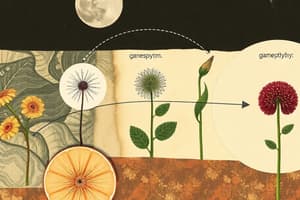Podcast
Questions and Answers
What is the first step of the angiosperm life cycle?
What is the first step of the angiosperm life cycle?
- The pollen grain germinates on the stigma
- One sperm nucleus fuses with the egg
- The seed is shed from the fruit
- The angiosperm life cycle begins with a diploid flower on the mature sporophyte plant (correct)
What do microsporocytes develop into after undergoing meiosis?
What do microsporocytes develop into after undergoing meiosis?
Haploid microspores
What is produced when the generative cell completes a second mitotic division?
What is produced when the generative cell completes a second mitotic division?
- One sperm nucleus
- Haploid megaspores
- Diploid zygote
- Two sperm nuclei (correct)
What forms after the fourth step of the angiosperm life cycle?
What forms after the fourth step of the angiosperm life cycle?
What happens to the seed after it is shed from the fruit?
What happens to the seed after it is shed from the fruit?
Flashcards are hidden until you start studying
Study Notes
Angiosperm Life Cycle
- Begins with a diploid (2n) flower on a mature sporophyte plant.
- Microsporocytes in the anther undergo meiosis, creating haploid (n) microspores.
- Each microspore undergoes mitosis, forming a generative cell and a tube cell, resulting in an immature microgametophyte (pollen grain).
Pollen Grain Development
- The generative cell undergoes a second mitotic division, yielding two sperm nuclei.
- In the ovule, a megasporocyte develops and undergoes meiosis, resulting in four haploid (n) megaspores.
- Three megaspores degenerate; the remaining one undergoes three mitotic divisions to form an eight-nucleate embryo sac, known as the mature megagametophyte.
Pollination and Fertilization
- Upon pollination, the pollen grain germinates on the stigma, and a pollen tube extends down the style towards the ovary through the micropyle.
- One sperm nucleus combines with the egg, forming a diploid (2n) zygote.
- The second sperm nucleus fuses with two polar nuclei to create a triploid endosperm, which serves as nutrition for the developing embryo.
Seed Development and Dormancy
- The embryo develops within the embryo sac, with the integuments of the ovule forming a protective seed coat.
- Once mature, the seed is released from the fruit; embryo development pauses until favorable conditions arise.
- Upon suitable conditions, seed germination occurs, and the embryo grows into a mature diploid (2n) sporophyte, ready to produce flowers and continue the alternation of generations cycle.
Studying That Suits You
Use AI to generate personalized quizzes and flashcards to suit your learning preferences.




